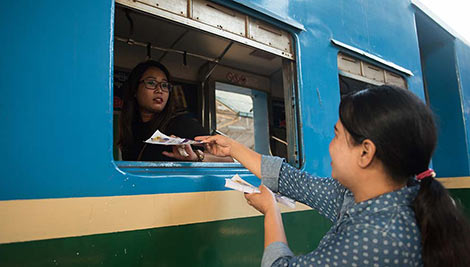 The United States was not the only country in the midst of election season this fall; many countries around the world held or will soon hold elections, and The Carter Center worked on three of them.
Learn more »
The United States was not the only country in the midst of election season this fall; many countries around the world held or will soon hold elections, and The Carter Center worked on three of them.
Learn more »
By Ben Spears, senior program associate, Conflict Resolution Program
This is an exciting time in Sudan. After 30 years, a period marked by civil war in Darfur and other areas of the country, Omar al-Bashir was forced from power in a revolution led largely by young women and men. Now Sudan is working out a new identity as it transitions to peace and democracy, and young people can lead the way. Learn more »
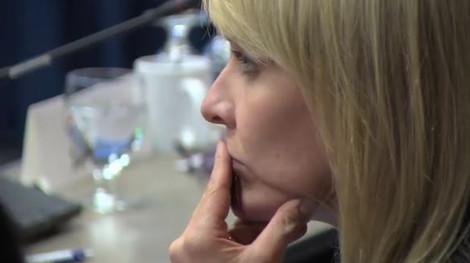
By Paige Alexander, chief executive officer, The Carter Center
I don’t need to tell you what a strange and challenging year 2020 has been. A pandemic has forced us to avoid close human interactions, but The Carter Center has been fortunate and is taking advantage of the opportunities that technology brings to keep moving forward with our mission to wage peace, fight disease, and build hope. Learn more »
By David Carroll, director, Democracy Program
Engaging in the U.S. is more complicated than in other countries because we don’t have a centralized election administration – we have a patchwork of about 10,000 jurisdictions across 50 states. (That, by the way, is one of several areas in which the U.S. falls short of international election standards.) Learn more »
 Dedicated service is common among community volunteers and health workers with whom The Carter Center partners, but Dorçelan Offre takes it to another level. Offre, 27, will do whatever it takes to help fight malaria in his native rural Haiti, even if it means going far beyond the end of the road.
Learn more »
Dedicated service is common among community volunteers and health workers with whom The Carter Center partners, but Dorçelan Offre takes it to another level. Offre, 27, will do whatever it takes to help fight malaria in his native rural Haiti, even if it means going far beyond the end of the road.
Learn more »
The Carter Center is partnering with Cure Violence Global and Princeton University’s Bridging Divides Initiative on a project to mitigate violence that could erupt in some U.S. communities in the days before and after the November election. Learn more »
Even as conflict in many areas of Syria subsides, dangers still remain – including abandoned or unexploded weapons that could kill or maim unsuspecting civilians as they try to rebuild their lives. Learn more »
Programs to combat neglected tropical diseases usually are aimed at people in villages at the end of the road and occasionally in big cities where all roads lead. But laborers in the fields of large commercial farms in Ethiopia’s Gambella region are often neither here nor there, leaving them vulnerable to contracting, and in some cases spreading, debilitating diseases. Learn more »
Most of the Carter Center’s work against neglected tropical diseases takes place in rural locations that are far from health care facilities and other resources. However, these diseases can be found in some unique urban settings, too, and the Center is just as committed to combating them there to ensure elimination is achieved. Learn more »
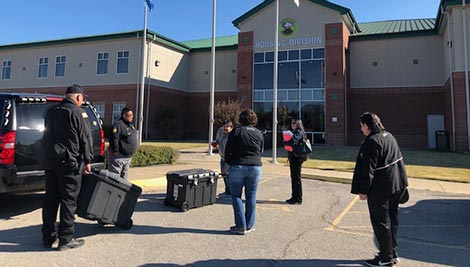 When North Dakota Democrats held their caucus in March, residents of the Fort Berthold Indian Reservation – which stretches over six counties and nearly a million acres – had just one designated spot to drop off ballots.
Learn more »
When North Dakota Democrats held their caucus in March, residents of the Fort Berthold Indian Reservation – which stretches over six counties and nearly a million acres – had just one designated spot to drop off ballots.
Learn more »
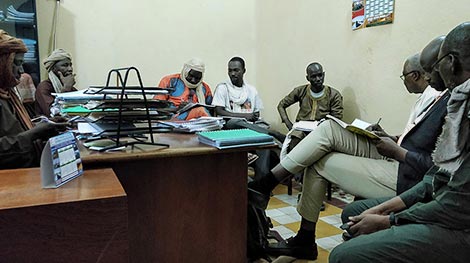 When the Carter Center team arrived in the northern Mali town of Gao one warm, blustery afternoon in February, tensions were running high. Two days earlier, a high-ranking general had been assassinated while tending his animals just outside of town. The killing cast a pall over a major achievement that took place earlier that morning: the deployment of the first 240 soldiers in the newly reconstituted Malian army, made up of combatants from three different elements that fought against each other during Mali’s civil war.
Learn more »
When the Carter Center team arrived in the northern Mali town of Gao one warm, blustery afternoon in February, tensions were running high. Two days earlier, a high-ranking general had been assassinated while tending his animals just outside of town. The killing cast a pall over a major achievement that took place earlier that morning: the deployment of the first 240 soldiers in the newly reconstituted Malian army, made up of combatants from three different elements that fought against each other during Mali’s civil war.
Learn more »
By Kelly Callahan, M.P.H., director, Trachoma Control Program
When COVID-19 appeared, the first thing public health experts advised us all to do was to wash our hands frequently and thoroughly. This is excellent advice, and it’s what the Carter Center’s Trachoma Control Program has been teaching people for 20 years. Learn more »
Dr. Nabil Aziz Awad Alla, the Carter Center's longtime country representative in Sudan, has not lived the quiet life of a pencil-pushing administrator. He's a hands-on boss who prefers to look his people in the eye and observe situations directly. Learn more »
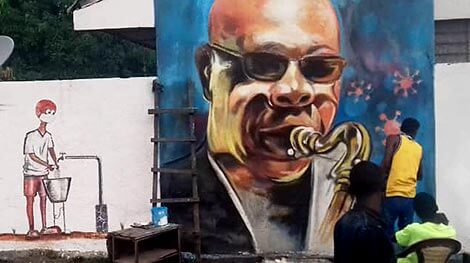 In the Democratic Republic of Congo, young artists with ties to The Carter Center are giving their time and talent to create paintings and songs that encourage people in their communities to prevent the spread of COVID-19.
Learn more »
In the Democratic Republic of Congo, young artists with ties to The Carter Center are giving their time and talent to create paintings and songs that encourage people in their communities to prevent the spread of COVID-19.
Learn more »
By Helen Robinson, associate director, public policy, Mental Health Program
Under the leadership of Rosalynn Carter, the Carter Center’s Mental Health Program is joining with partner organizations to bring attention to urgent public policy issues impacting mental health in Georgia and across the United States. The Carter Center’s Helen Robinson, associate director of public policy in the Mental Health Program, answers questions about how the program works to improve access to mental health care for all Georgians. Learn more »
From community engagement to water treatment and filtering to dog tethering, a cluster of villages in remote western Ethiopia is applying creative strategies to protect humans and animals from Guinea worm disease, and their diligence is paying off. Learn more »
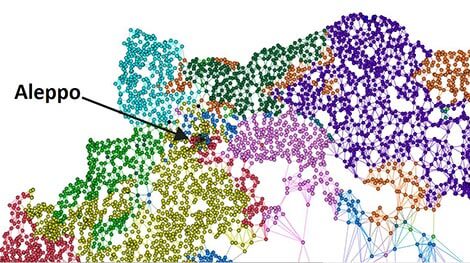 Nine years have passed since the conflict in Syria began. In recent months, as opposition strongholds have fallen and frontlines have shifted, the map of territorial control suggests that the conflict is entering its endgame.
Learn more »
Nine years have passed since the conflict in Syria began. In recent months, as opposition strongholds have fallen and frontlines have shifted, the map of territorial control suggests that the conflict is entering its endgame.
Learn more »
By Ambassador (ret.) Mary Ann Peters, chief executive officer
At this time of great challenges brought by the COVID-19 pandemic, I have been deeply moved by the commitment of our Carter Center staff to our mission to help the world’s poorest people. Indeed, our aim to wage peace, fight disease, and build hope has never been more urgent than it is today. Learn more »
Even as governments across the globe rush to protect their citizens from the deadly effects of COVID-19, some are using the coronavirus as an excuse to violate human rights laws and expand their powers. Learn more »
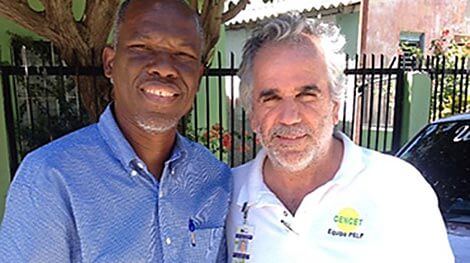 In 2006, the International Task Force for Disease Eradication urged that action be taken to eliminate the mosquito-borne diseases lymphatic filariasis and malaria from Hispaniola. Despite a turbulent history of economic disparity, tensions, and bloodshed, both nations eagerly agreed to binational cooperation, and The Carter Center launched the Hispaniola Initiative to assist them.
Learn more »
In 2006, the International Task Force for Disease Eradication urged that action be taken to eliminate the mosquito-borne diseases lymphatic filariasis and malaria from Hispaniola. Despite a turbulent history of economic disparity, tensions, and bloodshed, both nations eagerly agreed to binational cooperation, and The Carter Center launched the Hispaniola Initiative to assist them.
Learn more »
Carter Carter fellows have reported on managing coronavirus anxiety, the challenges of the mental health care system at this time, tips from mental health experts on staying mentally well, how the virus is impacting people experiencing homelessness and more. Learn more »
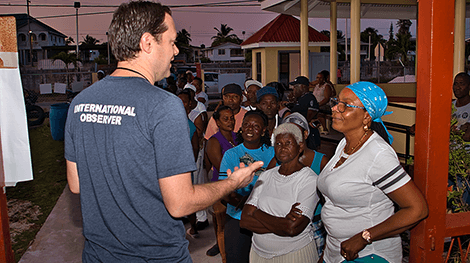 On March 2, citizens of Guyana went to the polls for what the country was calling “the mother of all elections.” Every election is important, of course, but this one was deemed especially so because five years ago, Exxon discovered massive amounts of oil off the coast of Guyana. The first barrels hit the market in January. Now this small, poor nation is poised to become a very rich one. And the country’s two major political parties – which are divided largely along ethnic lines – desperately want to control the coming wealth.
Learn more »
On March 2, citizens of Guyana went to the polls for what the country was calling “the mother of all elections.” Every election is important, of course, but this one was deemed especially so because five years ago, Exxon discovered massive amounts of oil off the coast of Guyana. The first barrels hit the market in January. Now this small, poor nation is poised to become a very rich one. And the country’s two major political parties – which are divided largely along ethnic lines – desperately want to control the coming wealth.
Learn more »
To aid individuals and communities during this time, the Carter Center Mental Health Program has compiled global, national, and local resources to promote mental health and wellness. Learn more »
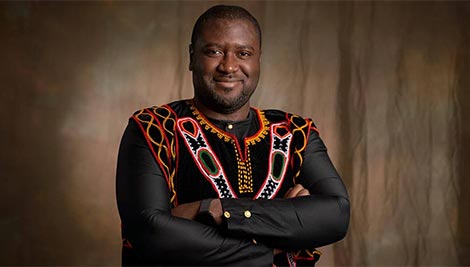 Thirteen years ago, The Carter Center opened the Human Rights House in Kinshasa, the capital of the Democratic Republic of Congo. It is home to a small team of staffers who perform a large amount of work – providing training and assistance to more than 100 local civil society organizations working on issues related to human rights, supporting a protection network that helps keep human rights defenders safe, and overseeing a variety of projects designed to spark youth engagement in democracy and human rights.
Learn more »
Thirteen years ago, The Carter Center opened the Human Rights House in Kinshasa, the capital of the Democratic Republic of Congo. It is home to a small team of staffers who perform a large amount of work – providing training and assistance to more than 100 local civil society organizations working on issues related to human rights, supporting a protection network that helps keep human rights defenders safe, and overseeing a variety of projects designed to spark youth engagement in democracy and human rights.
Learn more »
By Peace Habomugisha, Uganda country director
Steven Ocopcan is 77 years old, and he well remembers how river blindness affected his community in Uganda when he was a child. "At the time, people thought they had annoyed God and, in return, he cursed us," Ocopcan told me. "Many people sacrificed cows, goats, and hens to God, but this didn’t work. People accused one another of bewitching others. It was bad." Learn more »
 A provisional total of 53 cases of Guinea worm disease were reported in 2019, The Carter Center announced Wednesday. Intensified surveillance and reporting incentives in endemic areas in recent years have produced expected fluctuations in the small number of Guinea worm cases. When The Carter Center assumed leadership of the program in 1986, about 3.5 million human cases occurred annually in 21 countries in Africa and Asia.
Learn more »
A provisional total of 53 cases of Guinea worm disease were reported in 2019, The Carter Center announced Wednesday. Intensified surveillance and reporting incentives in endemic areas in recent years have produced expected fluctuations in the small number of Guinea worm cases. When The Carter Center assumed leadership of the program in 1986, about 3.5 million human cases occurred annually in 21 countries in Africa and Asia.
Learn more »
By Daniel Deng Madit Kuchlong, health agent, South Sudan’s Guinea Worm Eradication Program
Daniel Deng Madit Kuchlong, aka Daniel Deng, is a health agent with South Sudan’s Guinea Worm Eradication Program. Here is his firsthand account, lightly edited, of how Guinea worm has affected his life. Learn more »
By Laura Neuman, director, Rule of Law Program
Selima Begum, 28, is the mother of a 7-year-old boy with cerebral palsy. They live in Tuker Bazar Union, Sylhet Division, Bangladesh. Since her divorce, Begum has struggled to provide necessary medical care for her son, at times having to forgo routine medical treatments because of a lack of money. Though she works as a housecleaner when she can, it often does not pay enough to meet all her family’s needs. Learn more »
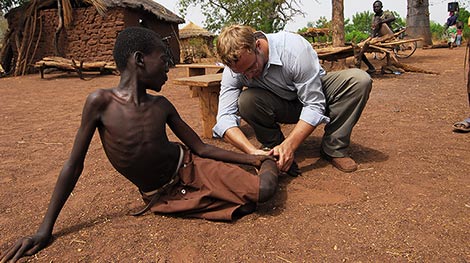 Weiss, who was named director of the Carter Center’s Guinea Worm Eradication Program a little more than a year ago, brings to the position both experience in the field and at the Center’s headquarters in Atlanta. With eight years living in Ghana and Ethiopia in many Guinea worm program roles, Weiss is uniquely positioned to understand the challenges of eradicating Guinea worm disease, an international campaign spearheaded by The Carter Center that has reduced cases more than 99.9% since 1986.
Learn more »
Weiss, who was named director of the Carter Center’s Guinea Worm Eradication Program a little more than a year ago, brings to the position both experience in the field and at the Center’s headquarters in Atlanta. With eight years living in Ghana and Ethiopia in many Guinea worm program roles, Weiss is uniquely positioned to understand the challenges of eradicating Guinea worm disease, an international campaign spearheaded by The Carter Center that has reduced cases more than 99.9% since 1986.
Learn more »
Please sign up below for important news about the work of The Carter Center and special event invitations.